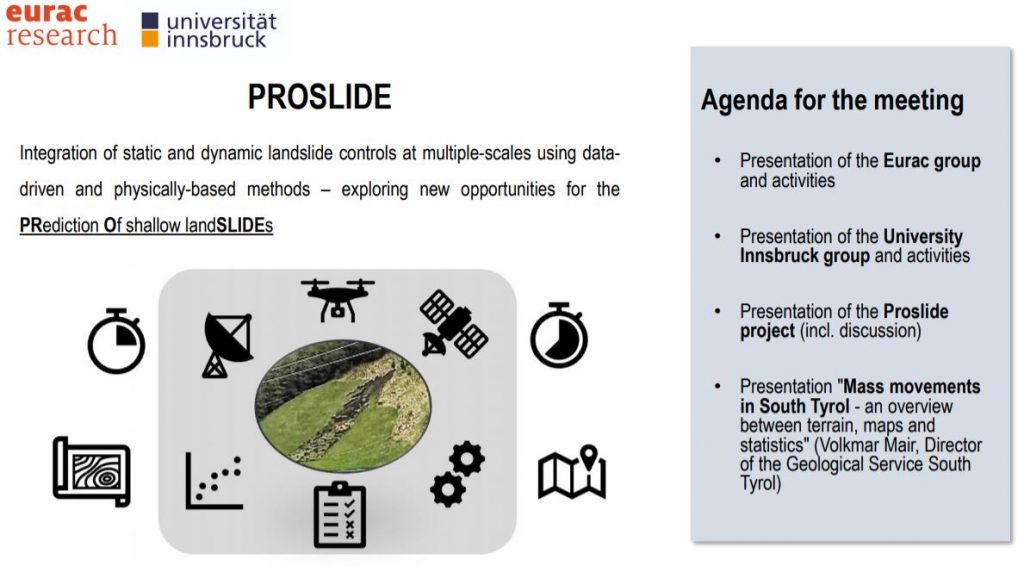The Kickoff-meeting for the PROSLIDE project took place on the 20th of November 2020. As almost everything these days virtually, but that did not seem to lessen the interest of the involved people. The main aim of the meeting was to (i) present the financed partners and their competences, namely the Institute for Earth Observation of Eurac Research and the Institute for Geography of the University Innsbruck, (ii) to present the project PROSLIDE and its activities and (iii) to obtain first insights into challenges related to landsliding in South Tyrol from a decision-maker viewpoint.

In total, 20 persons from a variety of institutions and associated partners followed the event: the University of Innsbruck (several departments), the Institute for Interdisciplinary Mountain Research (Austrian Academy of Sciences), the Office for Geology and Building Material Testing (Autonomous Province of Bolzano), the Civil Protection Agency (Autonomous Province of Bolzano), Department of Land, Environment, Agriculture and Forestry of the University of Padova, the Institute for Geo-Hydrological Protection (IRPI) of the Italian National Research Council (CNR).
In summary, at first the Eurac team presented itself. The Eurac Institute for earth observation will build upon the competence of three different research groups for the Proslide project: (i) Earth Observation for Environmental Monitoring, (ii) Advanced Computing for Earth Observation and (iii) Climate and Disaster Risk. Within Proslide, the Eurac team will seek to build upon its multifaceted expertise to tackle the challenge of predicting landslide processes in space and time. In this context, Eurac will focus on the regional-scale analysis of shallow landslides using statistical and machine learning methods. The team expects considerable innovation by integrating spatio-temporal information on past landslide occurrences with radar rainfall estimates and EO information (e.g. soil moisture derived from Sentinel-1).
The University of Innsbruck introduced themselves and their previous work in the field, particularly related to physically-based slope stability modelling and proximal remote sensing (LiDAR-based analyses). The University of Innsbruck will focus on the catchment scale and dynamic physically-based approaches. An initial exploratory analysis of available data and a field trip will be used to make a final decisions regarding the study sites.
The final part of the Kickoff-meeting was dedicated to a presentation by the director of the office for Geology and Building Material Testing, Dr. Volkmar Mair. This presentation provided deeper insights into the variety of gravity-driven processes in the province as well as associated data availabilities. The Proslide team will benefit substantially from the close exchange with the local domain experts.
The final discussion was used to clarify open issues, to define the next steps, and to characterize some innovative aspects of the project, such as the inclusion of RADAR rainfall and EO-bases soil moisture estimates.
